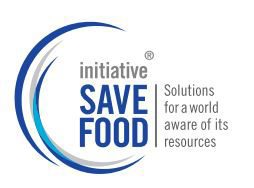GFCCC Delivers an Update on their International Data-Gathering Efforts at Global Session
Category : Press Release
Nantes, France –AUGUST 27, 2020 — The ICCC 2020 Conference, held from the 26ththrough to the 28th of August, began earlier this weekto highlight the topics of food quality and food safety in the cold chain, energy efficiency in the cold chain, refrigerants of tomorrow, innovative technologies in the cold chain and more. GFCCC is using a virtual presentation at the biennial event to connect attending stakeholders and governments to the coalition’s activity around these themes, mainly through the its data–gathering initiative it is pursuing with the United Nations Environment Programme (UNEP) Ozon Action.
“The ICCC Conference consistently brings the brightest minds in the cold chain space from around the globe to share the next generation of technology trends in these arenas. As a participant at the event, we are enthusiastic to present our food cold chain model, which we intend to develop as an international standard reference for the mapping and modelling food losses,”said Torben Funder Kristensen with GFCCC member company Danfoss, who is delivering the presentation.
The data gathering initiative is in the pilot phase and has been joined by six countries to lead in the development of the format.These six countries include Bahrain, Bosnia, Maldives, North Macedonia, Paraguay and Senegal. The GFCCC–UNEP Ozon Action project is being developed for these nations as a platform analysis for country–specific carbon footprints, including food loss and wastage, energy use, refrigerant use, impact of HCFC phase–out and HFC phase–down activities. It aims to provide a comprehensive picture of industries involved with cold chain and food supplyand bring attention to the burgeoning global problem of food loss and waste and the associated greenhouse gas emissions. In a report by the UN Food and Agriculture Organization (FAO), FAO estimates that global food loss and waste contribute 4.4 billion metric tons of carbon equivalent greenhouse gas emissions annually.
This activity is sponsored by the Eric Prieur Memorial Research Fund, originally created in August 2019 through a donation from the Carrier Corporation of $100,000, in memory of our active member, Eric Prieur, who passed away in the Ethiopian Airlines ET 302 plane crash in March 2019. Additional corporate contributions have now been received from an Advisory Board of industry and international policy experts including Bitzer, Danfoss, Lennox, and Emerson. The research made possible by this Fund will allow GFCCC to collaborate with policymakers, industry, and NGOs to achieve expansion of a sustainable cold chain and develop country–specific strategies for technology innovation and HFC reduction as per the Kigali Amendment to the Montreal Protocol and the Paris Climate Agreement.

